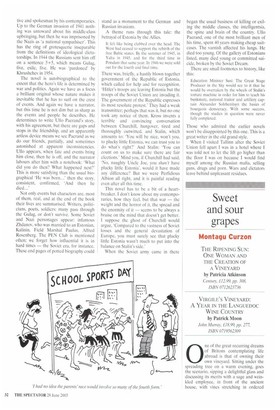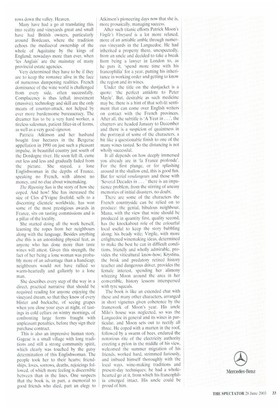Sweet and sour grapes
Montagu Curzon
THE RIPENING SUN: ONE WOMAN AND THE CREATION OF
A VINEYARD by Patricia Atkinson Century, ,I12,99, pp. 308,
ISBN 0712623736
VIRGILE'S VINEYARD: A YEAR IN THE LANGUEDOC WINE COUNTRY by Patrick Moon
John Murray, £18.99, pp. 277, ISBN 0719562309 ne of the great recurring dreams of Britons contemplating life abroad is that of owning their own vineyard. Sitting under the spreading tree on a warm evening, goes the scenario, sipping a delightful glass and discussing its merits with a sage and wrinkled employee, in front of the ancient house, with vines stretching in ordered rows down the valley. Heaven.
Many have had a go at translating this into reality and vineyards great and small have had British owners, particularly around Bordeaux, where the tradition echoes the mediaeval ownership of the whole of Aquitaine by the kings of England; nowadays more than ever, when 'les Anglais' are the mainstay of many provincial estate agencies.
Very determined they have to be if they are to keep the romance alive in the face of numerous dampening realities. French dominance of the wine world is challenged from every side, often successfully. Complacency is thus lethal; investment (massive), technology and skill are the only means of counter-attack, not helped by ever more burdensome bureaucracy. The dreamer has to be a very hard worker, a tireless salesman, patient filler-in of forms, as well as a very good vigneron.
Patricia Atkinson and her husband bought four hectares in the Bergerac appellation in 1990 on just such a pleasant impulse. in beautiful country just south of the Dordogne river. He soon fell ill, came out less and less and gradually faded from the picture. She stayed, a lone Englishwoman in the depths of France, speaking no French, with almost no money, and no clue about winemaking.
The Ripening Sun is the story of how she coped. And how! She has increased the size of Clos d'Yvigne fivefold, sells to a discerning clientele worldwide, has won some of the most prestigious awards in France, sits on tasting commissions and is a pillar of the locality.
She started doing all the work herself. learning the ropes from her neighbours along with the language. Besides anything else this is an astonishing physical feat, as anyone who has done more than taste wines will attest. Given this strength, the fact of her being a lone woman was probably more of an advantage than a handicap; neighbours would not have rallied so warm-heartedly and gallantly to a lone man.
She describes every step of the way in a direct, practical narrative that should be required reading for anyone enjoying the vineyard dream, so that they know of every blister and backache, of seeing grapes when you close your eyes at night, of tastings in cold cellars on wintry mornings, of confronting large forms fraught with unpleasant penalties, before they sign their purchase contract.
This is also an impressive human story. Gageac is a small village with long traditions and still a strong community spirit, which clearly was touched by the gutsy determination of this Englishwoman. The people took her to their hearts; friendships, loves, sorrows, deaths, rejoicings followed, of which more feeling is discernible between than in the lines. One suspects that the book is, in part. a memorial to good friends who died, part an elegy to Atkinson's pioneering days now that she is, more prosaically, managing success.
After such titanic efforts Patrick Moon's Virgile's Vinevard is a lot more relaxed, more of an amiable amble through numerous vineyards in the Languedoc. He had inherited a property there, unexpectedly, from an uncle and decided to take a break from being a lawyer in London to, as he puts it, 'spend more time with his francophilia' for a year, putting his inheritance in working order and getting to know the region and its wines.
Under the title on the dustjacket is a quote: the perfect antidote to Peter Mayle'. But, desirable as such medicine may be, there is a hint of that soft-lit sentiment that can come over English writers on contact with the French provinces. After all, the subtitle is 'A Year in ...', the chapters are headed January to December and there is a suspicion of quaintness in the portrayal of some of the characters, a bit like a questionable finish to one of the many wines tasted. So the distancing is not wholly successful.
It all depends on how deeply immersed you already are in 'la France profonde'. For the first plunge, or for splashing around in the shallow end, this is good fun. But for serial rendangeurs and those with 'Several Decades in . . . 'there is an impatience problem, from the stirring of uneasy memories of initial disasters, no doubt.
There are some of the characters the French countryside can be relied on to produce: the genial, bibulous neighbour, Manu, with the view that wine should be produced in quantity first, quality second. has the knockabout role of the colourful local useful to keep the story bubbling along; his beady wife; Virgile, with more enlightened winemaking ideas, determined to make the best he can in difficult conditions, friendly and wholly admirable, provides the viticultural know-how; Krystina, the brisk and predatory retired history teacher and dangerous driver, provides the female interest, spending her alimony whizzing Moon around the area in her convertible, history lessons interspersed with tyre squeals.
The book is like an extended chat with these and many other characters, arranged in short vignettes given coherence by the framework of Moon's year. His uncle Milos house was neglected, so was the Languedoc in general and its wines in particular, and Moon sets out to rectify all three. He coped with a marten in the roof, followed by a swarm of bees, endured the notorious rite of the electricity authority erecting a pylon in the middle of his view, welcomed the summer migration of his friends, worked hard, strimmed furiously, and imbued himself thoroughly with the local ways, wine-making traditions and present-day techniques; he had a wholehearted go at it, from which his francophilia emerged intact. His uncle could be proud of him.



































































 Previous page
Previous page